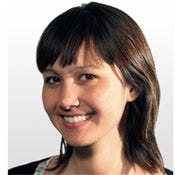Practice Fusion digitizes medical records and provides a way to structure the data. Kaggle discovers algorithms that look at data patterns to identify trends. 100Plus personalizes the data to recommend lifestyle changes. I spoke to data scientists from those companies at a panel held at Practice Fusion yesterday.

Last week I moderated a panel on the social impact of data science. I spoke with Jake Marcus, data scientist at Practice Fusion; Guy Cavet, vice president of Life Sciences at Kaggle; and Chris Hogg, CEO and co-Founder at 100Plus.
Practice Fusion digitizes medical records, then provides a way to structure the data and conduct "syndromic surveillance," i.e. the ability to track the performance of a drug after it has hit the market. Kaggle discovers algorithms that look at data patterns to identify trends. 100Plus personalizes health data to recommend lifestyle changes.
We discussed the quantified self movement and how consumer tech is helping to collect more data about individuals. We talked about how brains are being outsourced to create better algorithms to solve problems and to identify new trends. We also discussed how big data can have a huge social impact and help you and your doctor to make better health decisions.
Watch the video for the 30-minute panel discussion on how health data is having a social impact:
About the Author(s)
You May Also Like







